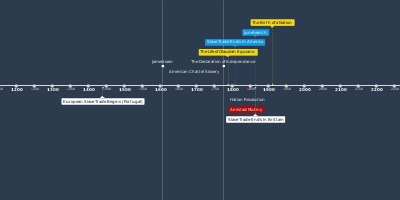27 Apr 1903 Jahr - Giles v. Harris
Beschreibung:
A United States Supreme Court case in which the Court upheld a state constitution's requirements for voter registration and qualifications. Although the plaintiff accused the state of discriminating in practice against black citizens, the Court found that the requirements applied to all citizens and refused to review the results "in practice," which it considered overseeing the state's process. As there was no stated intent in law to disfranchise blacks, the Court upheld the state law.The plaintiff, Jackson W. Giles, sued on behalf of more than 5000 black citizens of Montgomery, Alabama, such as himself in seeking to have the federal court require the state to register them to vote. The suit was brought in response to a number of provisions in the Alabama state constitution, which combined to prevent blacks from being able to register. Giles was literate and had voted in Montgomery for 30 years, from 1871 to 1901, before the new constitution was passed.
One of the new provisions held that any person registered before January 1, 1903, as most whites were, would thereafter be registered for life. That was a type of grandfather clause. Any person not registered at that time, as most blacks were not, would have to satisfy a number of requirements before being allowed to register. This gave local officials the authority to bar voters. They included a test of the potential registrant's understanding of the duties and obligations of citizenship. This test was administered by white election officials, who conducted it in a subjective manner that resulted in most whites' being approved to register and most blacks being rejected.
The district court dismissed the case on the grounds that the suit was not seeking enough in damages to bring it within the jurisdiction of the federal courts. At the time, a statute was in place requiring that cases brought under federal question jurisdiction satisfy an amount-in-controversy requirement of $2000. Giles had not specified any amount of monetary damages. The plaintiff appealed the dismissal to the Supreme Court. He appealed against the decision.
The Supreme Court, in an opinion written by Justice Oliver Wendell Holmes, Jr., decided to uphold the dismissal of the case, for two reasons:
First, the Court noted that the plaintiffs were asserting that the entire registration system was unconstitutional, but the only relief they sought was to be registered. The Court suggested that it would solve nothing for the names of the plaintiffs to be added to the voter rolls while the entire voting process remained illegal.
Second, the Court noted that under the doctrine set forth in Hans v. Louisiana (1890), the Eleventh Amendment prohibited the plaintiff from suing the state directly in a United States federal court. Since the federal court has no power to issue an order to the state, the only way that the plaintiff's ability to vote could be enforced would be for the court to monitor the entire election process, which would be difficult in light of the overwhelming desire of the white population to prevent blacks from voting.
Zugefügt zum Band der Zeit:
Datum:
27 Apr 1903 Jahr
Jetzt
~ 122 years ago
